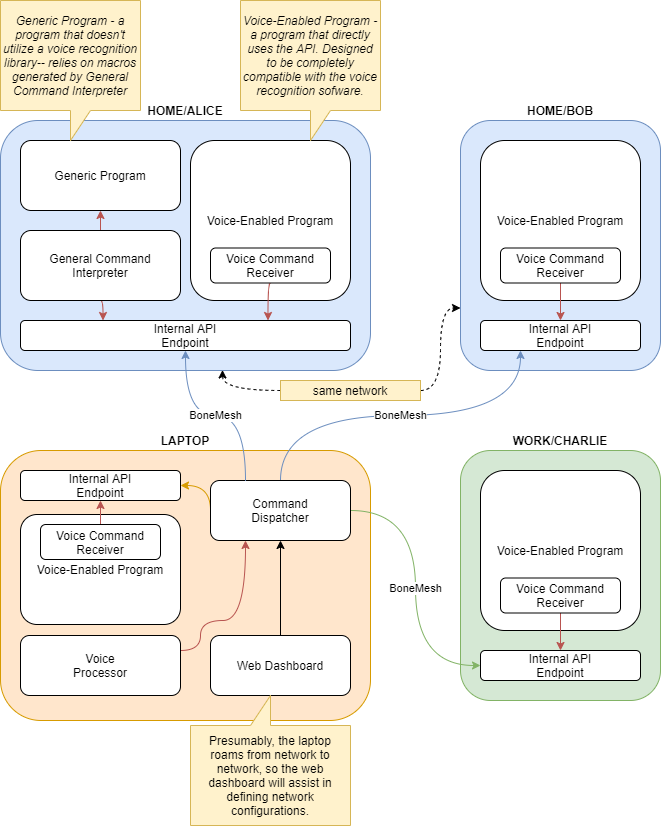About

In the fall semester of 2020, seven senior students at the University of Central Oklahoma gathered to create
the original implementation of the protocol known now as V2C.
- Caleb was the chief architect of the high-level architecture and API, served as the team lead, designed the
deterministic finite-state automata standard used to manipulate various components, designed the dashboard
backend, and built the proof-of-concept submission package for the capstone project.
- Nicholas served as the product owner for the project; he also conceptualized and became the chief engineer of
the desktop controller.
- Cole served as our lead quality assurance analyst and also was the chief engineer for the gaming proof-of-concept,
a critical component in our work to prove that nearly anything on a machine could be controled with your voice.
- Everistus was the lead dashboard UX/UI engineer and ensured that other graphical components could be snapped in
to the proof-of-concept easily. He also ensured that messages were routed appropriately to the various gaming
modules.
- Rashed was the principle engineer of the voice recognition module, which serves as the starting point of the
entire workflow.
- Jon was instrumental as an engineer for both the desktop controller, especially with regard to implementing the
deterministic finite state automata, and for the dispatcher, especially with regard to the pull-based API
implementation.
- Glen designed and engineered one of the proofs-of-concept for the gaming component of the dashboard.
When the class ended, all of the original members went on to continue contributing at the
Edmond ACM Chapter because they felt that V2C had the potential
to become an important protocol standard in the future.
Original Work
V2C resulted from a combination of ideas proposed by Caleb, Everistus, and Nicholas. The ultimate idea was to
create a new protocol that would allow individuals to use their voices to control their computers over various
networks, no matter where they were physically located at any given point in time. The vision: imagine that you
walk into a computer lab-- you expect that the computers you use already have standardized devices and functionalities.
For example, you'd be very confused if your computer didn't have a mouse, or an internet connection. Imagine walking
into a computer lab and having the ability to use your voice on any computer, using grammars that you've already
customized in place-- even before you've ever physically used the computer in question. This goal reflects the vision
of the V2C Development Team.

To achieve this widespread functionality, the platform was designed to be incredibly modular-- see the diagram above.
Modularity, enforced with API-driven development, was also incredibly important to make it easier for other third-party
developers to add their own modules to the project. While the protocol is being developed by the
Edmond ACM Chapter now, you can still view and fork the old code
by visiting GitHub.
Contribute

You can still contribute to the ongoing development of the protocol! The
Edmond ACM Chapter has taken up the development of the protocol and
reference implementation-- you can fork that or contribute to it on
Bitbucket.
If you'd like to be more involved in designing the specification itself, we invite you to
join the Edmond ACM Chapter today!
Contact
Elements
Text
This is bold and this is strong. This is italic and this is emphasized.
This is superscript text and this is subscript text.
This is underlined and this is code: for (;;) { ... }. Finally, this is a link.
Heading Level 2
Heading Level 3
Heading Level 4
Heading Level 5
Heading Level 6
Blockquote
Fringilla nisl. Donec accumsan interdum nisi, quis tincidunt felis sagittis eget tempus euismod. Vestibulum ante ipsum primis in faucibus vestibulum. Blandit adipiscing eu felis iaculis volutpat ac adipiscing accumsan faucibus. Vestibulum ante ipsum primis in faucibus lorem ipsum dolor sit amet nullam adipiscing eu felis.
Preformatted
i = 0;
while (!deck.isInOrder()) {
print 'Iteration ' + i;
deck.shuffle();
i++;
}
print 'It took ' + i + ' iterations to sort the deck.';
Lists
Unordered
- Dolor pulvinar etiam.
- Sagittis adipiscing.
- Felis enim feugiat.
Alternate
- Dolor pulvinar etiam.
- Sagittis adipiscing.
- Felis enim feugiat.
Ordered
- Dolor pulvinar etiam.
- Etiam vel felis viverra.
- Felis enim feugiat.
- Dolor pulvinar etiam.
- Etiam vel felis lorem.
- Felis enim et feugiat.
Icons
Actions
Table
Default
| Name |
Description |
Price |
| Item One |
Ante turpis integer aliquet porttitor. |
29.99 |
| Item Two |
Vis ac commodo adipiscing arcu aliquet. |
19.99 |
| Item Three |
Morbi faucibus arcu accumsan lorem. |
29.99 |
| Item Four |
Vitae integer tempus condimentum. |
19.99 |
| Item Five |
Ante turpis integer aliquet porttitor. |
29.99 |
|
100.00 |
Alternate
| Name |
Description |
Price |
| Item One |
Ante turpis integer aliquet porttitor. |
29.99 |
| Item Two |
Vis ac commodo adipiscing arcu aliquet. |
19.99 |
| Item Three |
Morbi faucibus arcu accumsan lorem. |
29.99 |
| Item Four |
Vitae integer tempus condimentum. |
19.99 |
| Item Five |
Ante turpis integer aliquet porttitor. |
29.99 |
|
100.00 |


